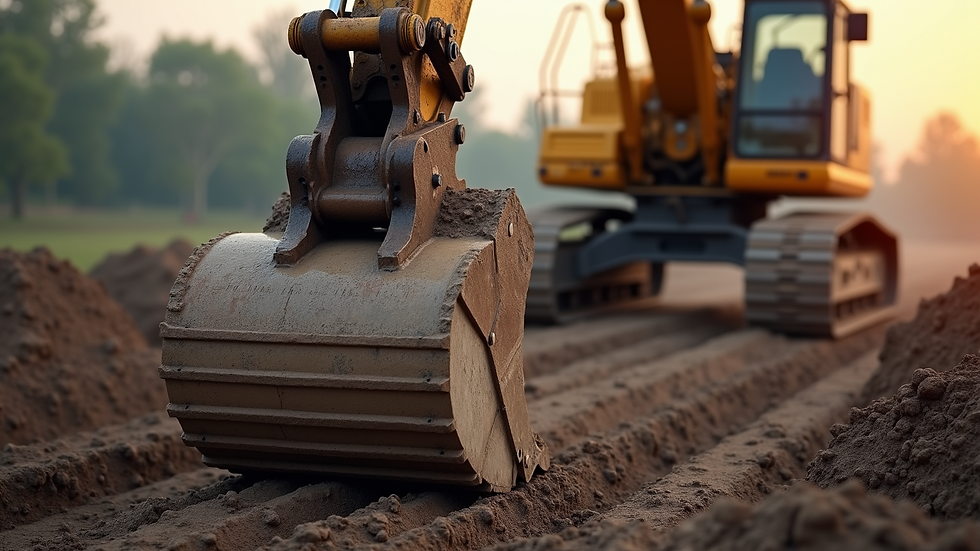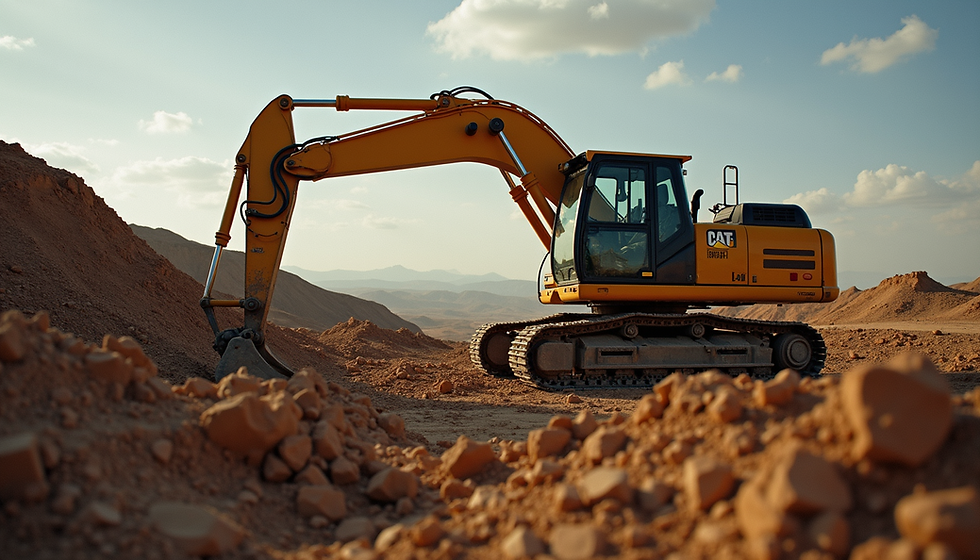The Essential Role of Excavators in Transforming Your Omaha Demolition Project
- Liberty Grading & Excavation

- Jul 22
- 5 min read
When you start a demolition project in Omaha, the right tools can make a big difference. Among the most vital pieces of equipment is the excavator. Knowing why an excavator is essential for your demolition site will help you make choices that lead to a successful outcome. These machines not only speed up the process but also ensure safety and effective debris management.

Understanding Demolition: The Need for Heavy Equipment
Demolition projects, especially in urban areas like Omaha, present unique challenges. You need to dismantle structures carefully to avoid affecting nearby buildings while also prioritizing safety. Heavy machinery, particularly excavators, is crucial for managing these challenges effectively.
Excavators are equipped with a boom, stick, and bucket. This specialized design enables them to carry out various demolition tasks. They can tear down walls, remove foundations, and clear debris all in one machine. For instance, a heavy-duty excavator can typically lift around 10 tons of rubble at a time, paving the way for faster cleanup and preparation for new construction.
The Versatility of Excavators in Demolition Projects
Various Attachments for Specific Needs
Excavators shine in their versatility, thanks to a wide range of attachments that make them adept at different tasks during demolition. Common attachments include:
Hydraulic Breakers: Ideal for demolishing concrete structures quickly. For example, a hydraulic breaker can break through a 12-inch thick concrete wall in less than an hour, a task that may take a full day with manual tools.
Demolition Grabs: Useful for efficiently lifting and moving large debris. These attachments ensure that post-demolition clean-ups are fast and efficient.
Buckets of Various Sizes: From small for tight spaces to large for handling vast quantities of material, these buckets optimize excavation and cleanup. An excavator using a 2-cubic-yard bucket can remove debris at twice the speed of manual labor alone.
This equipment flexibility allows contractors to complete multiple tasks with one machine, saving both time and costs.
Enhanced Safety Features
Safety is a critical concern in demolition. Excavators come with various safety features that improve the work environment. Key features include:
Stable Track Systems: They provide stability while lifting heavy objects, preventing tipping on uneven ground.
Operator Safety Cages: These help in protecting operators from falling debris, ensuring safety.
Advanced Hydraulic Systems: Provide precise control, reducing the chances of accidents. Studies show that jobs with skilled operators using excavators can reduce workplace accidents by up to 30%.
These safety measures significantly lower risks, creating a safer environment for both workers and neighboring residents.
Efficiency in Demolition: Saving Time and Labor
Streamlined Operations
Excavators can drastically cut the time required to complete demolition. For instance, what might take manual labor days can be finished in hours using an excavator. The advantages include:
Faster Project Completion: A project that relies on an excavator may finish weeks ahead of schedule, allowing for quicker land preparation or new construction.
Reduced Labor Costs: Fewer workers are needed when using heavy machinery. This can lead to a reduction in labor costs by up to 40%, as fewer people are needed for manual tasks.
Investing in an excavator not only speeds up work but also enables better management of human resources.
Effective Debris Management
After demolition, debris management can become a daunting task. Excavators excel in rapidly clearing wreckage and moving large volumes of material. Benefits include:
Facilitated Site Clean-up: By efficiently scooping and transporting debris, excavators can cut clean-up time significantly. A site that might take a week to clear can often be ready in as little as three days with an excavator.
Preparing Ground for New Construction: An excavator ensures the land is swiftly cleared for new foundations, setting the stage for timely project advancement.
Focused debris management using excavators simplifies the transition to subsequent project stages.
Environmental Considerations in Demolition
Many homeowners are conscious of their environmental impact during demolition. Excavators can play a substantial role in more sustainable practices by:
Waste Reduction
Demolition often leads to significant waste production. Excavators with specialized attachments can help separate recyclable materials, leading to:
Higher Recycling Rates: Efficient on-site sorting can increase recycling rates of materials like bricks, metals, and concrete to over 75%.
Minimized Landfill Use: Reducing waste sent to landfills aligns with eco-friendly goals and can even lower disposal costs by about 25%.
Reduced Carbon Footprint
Modern excavators are often designed with energy-efficient engines that lower fuel consumption and emissions. By selecting excavators with:
Lower Emissions Standards: Homeowners can positively impact air quality during demolition.
Fuel Efficiency Features: Machines that optimize fuel usage can reduce the overall carbon footprint by as much as 20%.
Choosing excavators with a focus on environmental responsibility supports sustainable practices while aligning with the values of many Omaha homeowners.

The Importance of Professional Operation
Trained Operators
Though excavators are powerful, their effective use relies heavily on the operator's skills. Employing professional operators is essential for several reasons:
Increased Safety: Experienced operators understand how to operate heavy machinery safely, reducing risks.
Effective Manipulation: Skilled operators can utilize an excavator’s full capabilities, ensuring tasks are performed correctly and efficiently.
Minimized Risks of Damage: Professionals can avoid damaging surrounding buildings, ensuring smooth demolition.
Hiring skilled operators ensures that your demolition project runs safely and smoothly.
Project Planning: Integrating Excavators into Your Demolition Plan
Assessing Project Needs
Before starting demolition, thoroughly assess your site and its specific needs. Important considerations include:
Understanding Structural Integrity: Knowing which parts of the building must be demolished guides your choice of excavator and attachments.
Evaluating Site Conditions: Factors like soil type, space limitations, and surrounding structures can influence machinery choice.
Proper planning leads to better decisions and an efficient demolition process.
Budgeting for Equipment Rental
When planning for an excavator, budgeting is critical. Rental costs vary based on machine size and project duration. Consider these tips:
Get Multiple Quotes: Compare prices from different rental companies to find the best deal.
Consider Long-term Rental: For projects that require several weeks, you may find that a long-term rental offers more cost-effective pricing.
Include Operator Fees: Don’t overlook the costs of hiring a qualified operator, which can be an essential part of the budget.
By planning your finances carefully for the inclusion of an excavator, you enhance project efficiency and stay within budget.

Final Thoughts
Incorporating an excavator into your Omaha demolition project brings numerous advantages, from improved safety and speed to effective debris management and eco-friendly practices. The versatility and power of excavators allow homeowners to streamline demolition processes while maintaining high safety standards.
With proper planning and skilled operators, you can maximize the capabilities of these machines, ensuring a seamless transition from demolition to new construction. Understanding the essential role of excavators can transform your demolition project into a successful endeavor.
Whether you are planning a home remodel or a complete tear-down, consider how an excavator can help you pave the way for future growth and development.




Comments